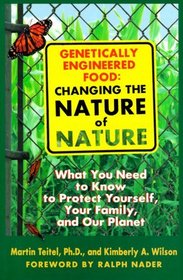Search -
Genetically Engineered Food: Changing the Nature of Nature: What You Need to Know to Protect Yourself, Your Family, and Our Planet
Genetically Engineered Food Changing the Nature of Nature What You Need to Know to Protect Yourself Your Family and Our Planet
Author:
The book that exposes the threat to our food supply from genetic engineering. * Explains the dangers of these foods in easily understood terms. * Provides a comprehensive guide to actions you can take to safeguard your food supply. Picture a world where the french fries you eat are registered as a pesticide. Where corn plants kill monarch butt... more »
Author:
The book that exposes the threat to our food supply from genetic engineering. * Explains the dangers of these foods in easily understood terms. * Provides a comprehensive guide to actions you can take to safeguard your food supply. Picture a world where the french fries you eat are registered as a pesticide. Where corn plants kill monarch butt... more »
ISBN-13: 9780892818884
ISBN-10: 0892818883
Publication Date: 11/1999
Pages: 192
Rating: ?
ISBN-10: 0892818883
Publication Date: 11/1999
Pages: 192
Rating: ?
0 stars, based on 0 rating
Genres:
- Health, Fitness & Dieting >> Diets & Weight Loss
- Health, Fitness & Dieting >> Nutrition >> General
- Health, Fitness & Dieting >> Nutrition >> Genetically Engineered Food
- Parenting & Relationships >> Parenting >> Health & Nutrition
- Science & Math >> Evolution >> Genetics
- Science & Math >> Agricultural Sciences >> Food Science
- Engineering & Transportation >> Professional Science >> Agricultural Sciences >> Food Sciences
- Engineering & Transportation >> Professional Science >> Evolution >> Genetics
- Medical Books >> Basic Sciences >> Genetics




